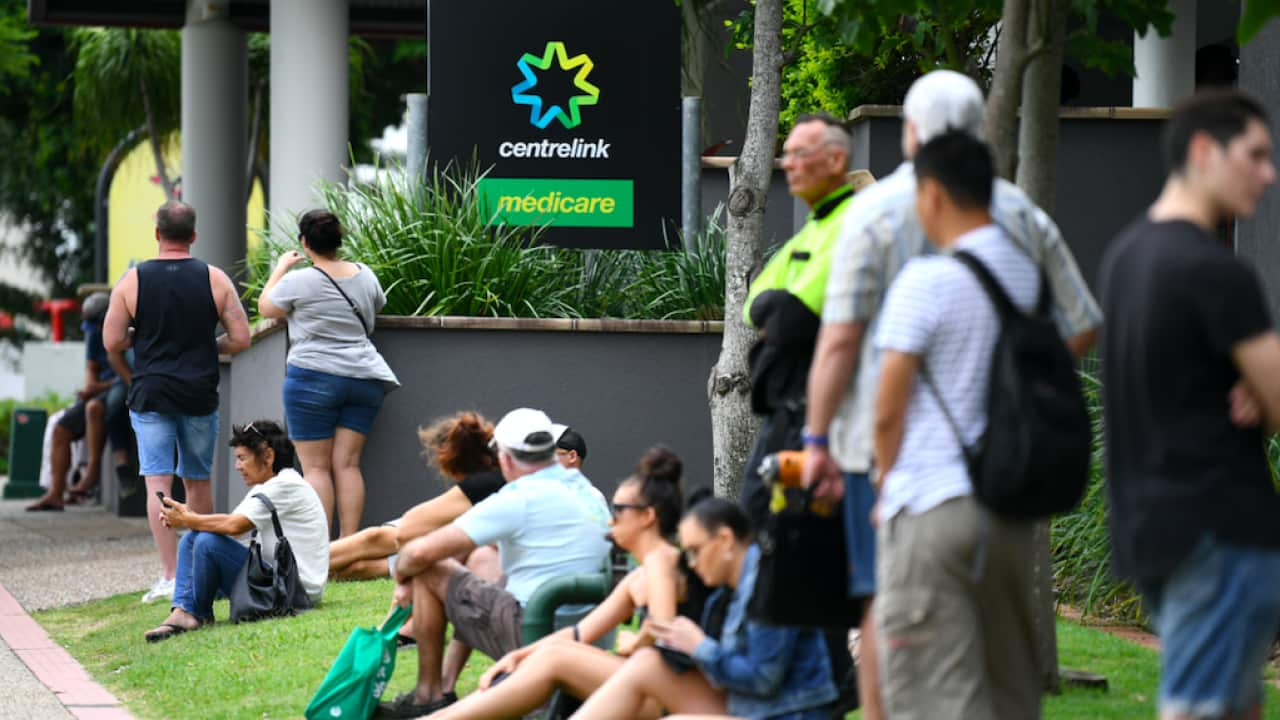More than two million people across Australia are set to take a $300 cut to their fortnightly welfare payments as the federal government begins to wind back coronavirus supplements.
The fortnightly coronavirus boost - announced to bolster welfare support during the coronavirus pandemic - applies to people receiving Jobseeker, Youth Allowance, Austudy and .
From 25 September, the coronavirus payment will be scaled back from $550 to $250 per fortnight - before it is set to be removed entirely from 1 January next year.
So, who is set to be impacted by the welfare changes and why is the government scaling back its support?

The coronavirus pandemic has seen a surge in unemployment amid the economic fallout of the crisis. Source: AAP
Government defends ‘transitioning down’ of welfare payments
Those set to be impacted by the welfare cuts include up to one million jobless Australians still facing the prospect of trying to find work amid the country’s first recession in almost three decades.
The official unemployment rate fell from 7.5 per cent in July to 6.8 per cent in August.
Treasurer Josh Frydenberg has defended the government’s decision to scale back the supplement payment, describing the move as a “transitioning down” of support.
“We doubled the safety net going into the crisis,” he told reporters on Friday.
“We’ll make a decision about further support for people in Jobseeker, but we’re leaning in on continuing to provide support.”
The government has long said the supports were designed as a "temporary" measure in response to the challenges of the pandemic.
Other welfare programs preparing to be wound back to pre-pandemic levels include partner allowances, widow allowances, the ABSTUDY living allowance, the parenting payment, the farm household allowance and special benefit payments.
Peak advocacy group ACOSS has labelled the cuts “devastating”, warning uncertainty surrounding the future of these payments is affecting the mental health of welfare recipients.
“The cuts and uncertainty that about what will come in December are deeply distressing for people and will no doubt be affecting people’s mental health,” ACOSS chief executive Cassandra Goldie said.
“We urge the government to immediately extend the current rate.”

People lining up at a Melbourne Centrelink office. Source: AAP
What do the JobSeeker changes mean for you?
The new Jobseeker rate for unemployed recipients will be roughly $58 per day – compared to pre-pandemic levels of $40 a day, which has been long criticised by advocacy groups as inadequate.
Depending on your personal situation the fortnightly jobseeker payments - previously known as Newstart - are paid at varying rates.
A single person with no children will now be eligible for $815 a fortnight, consisting of the $565 Jobseeker payment and $250 coronavirus supplement.
If an individual is caring for a child this increases their payment to $862 a fortnight, while having a partner will result in someone's payment being slightly lower at $760.
People will also be able to earn up to $300 per fortnight before their payment is affected, which would bring their total income to $1,115 per fortnight.
However, to be eligible for this part-payment, the income of a single person with no children has to be below the threshold of $1,257 per fortnight.
Warnings against welfare cut during economic recession
The Australian Council of Trade Unions has warned against cutting back the payments amid the fallout of the pandemic’s economic recession.
ACTU President Michele O’Neil said the federal government needed to commit to a permanent increase to the payments to ensure the financial security of families.
“Despite not having a plan for how to get people back into jobs, the Morrison government is now cutting support for people in our community who have been hardest hit by this pandemic,” she said.
Treasurer Josh Frydenberg said the government is introducing a range of measures to get people back to work as he prepares to hand down the federal budget in two weeks' time.
“We have many initiatives and many more that will be in place … to put money into the economy, to increase spending and economic activity and create jobs,” he said.
What is the impact on the economy?
Deloitte Access Economics has also found the impact of cutting Jobseeker will reduce the size of the economy by $31.3 billion and cost the equivalent of 145,000 full time jobs over two years.
Grattan Institute economist Brendan Coates said now is not the time to rollback the Jobseeker supplement, warning there is currently around one job available for every twelve job seekers.
"We know that spending on something like Jobseeker is just about the most effective stimulus that we can provide because we know low income earners go out and spend that money in the economy," he told SBS News.
"The scaling back of Jobseeker is equivalent to roughly a billion dollars a month and so that will have a substantial impact on the economy."
The Jobkeeper wage subsidy also faces changes from Monday, when it will be extended at reduced rates for six months.
Payments for full-time staff are being cut from $1500 to $1200 per fortnight, while people who usually worked less than 20 hours a week before the coronavirus pandemic will receive $750.
Labor's finance spokesman Jim Chalmers said the cuts will take money out of the economy.
"It makes no sense for the Government to be cutting support when we've got unemployment unacceptably high, the economy is unacceptably weak, and they still don't have a jobs plan to replace this support," he told reporters.
People in Australia must stay at least 1.5 metres away from others. Check your state’s restrictions on gathering limits.
If you are experiencing cold or flu symptoms, stay home and arrange a test by calling your doctor or contact the Coronavirus Health Information Hotline on 1800 020 080.
Additional reporting from AAP.











